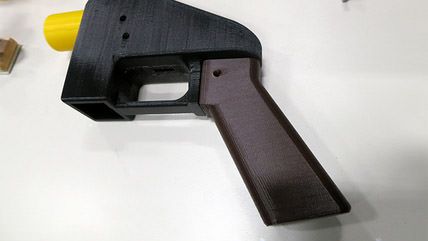Letters

The Unstoppable Plastic Gun
In "The Unstoppable Plastic Gun" (December), Brian Doherty describes how easy it is to create a 3D printed gun: "To make this gun, you don't have to be a gunsmith, or have access to a large industrial operation."
There is nothing new under the sun. When I was young, we made .22 rimfire guns out of automobile radio antenna sections wrapped in brass wire from the hardware store. Metal pipe of the correct diameter will make a working shotgun. It really isn't difficult-only tedious-to carve a working, major-caliber pistol from raw steel, or maybe malleable iron. Even a primitive revolver is within do-it-yourself possibility.
As for "large industrial operations," where does one get a 3D printer? I assume it can't be built from corrugated cardboard or cereal box tops. People who think can always make effective arms, regardless of governmental prohibitions. They don't need 3D printers to do it.
Steve Henigson
Eastsound, WA
Just Say No to College
I agree with Paul Gu ("Just Say No to College," December) that deep systemic problems with educational finance are pushing us backward to the days when higher education was the luxury of a privileged few. I disagree that the Upstart model he proposes combats this trend. It simply makes selling oneself as chattel more fashionable.
Gu points out technical differences between historical indentured servitude and Upstart, but the similarities in spirit are greater. The "freedom of choice" touted by Upstart is essentially an increased assignment of risk to the borrower. The investor is no longer responsible for the selection of collateral or analysis of a business plan, other than reviewing the stated intentions of the Upstart on a Web profile.
Grant Heitman
San Ramon, CA
Letters are welcome and should be addressed to
reason 1747 Connecticut Avenue, NW Washington, DC 20009 fax: 202-315-3623 letters@reason.com
"The death of InTrade (at least in America) is a damn shame. The Internet allowed the creation of futures markets to predict ANYTHING, instead of the limited commodities that are traded on floors in Chicago. The price of entry allowed millions of people to back up their opinions on matters of public importance with a relatively small amount of cash. What did we learn from InTrade's short life? That a market where huge numbers of people can freely exchange is actually pretty good at predicting things. If InTrade started expanding into, say, oil price predictions it could have been a serious challenge to the power of the trading floors."
-reason.com commenter "bassjoe" in response to "The Death of Intrade" (December)
"I keep thinking that eventually kids grow up and realize there is no Santa Claus, and they grow up and realize that the government isn't Santa Claus. I'm probably wrong about the first part, too."
-reason.com commenter "Brian" in response to "The Intolerant State" (December)
"Honest cops should be glad to have their encounters with the public recorded. The fact that so many are opposed to these cameras is certainly telling."
-reason.com commenter "WTF" in response to "Watched Cops are Polite Cops" (December)
